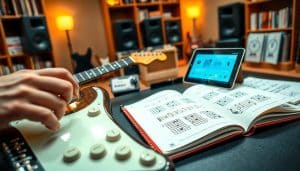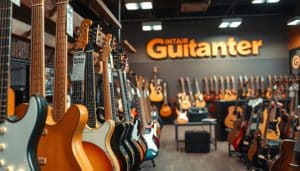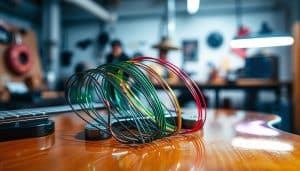Are you a jazz guitarist on the hunt for the perfect amp to complement your smooth melodies and sophisticated chord progressions? Look no further! In this comprehensive guide, we will explore the world of jazz guitar amps and help you navigate through the countless options available, so you can find the best one for your playing style and sound preferences. Whether you’re a seasoned professional or just starting out, this guide is here to assist you in making an informed decision and taking your jazz guitar playing to new heights. Join us as we embark on a journey to discover the ultimate jazz guitar amp!

Understanding the Essentials of a Jazz Guitar Amp
What is a jazz guitar amp?
A jazz guitar amp, as the name suggests, is an amplifier specifically designed for guitarists playing jazz music. It is an essential piece of equipment that helps to shape the tone and color of the guitar, allowing the musician to achieve the desired sound for jazz music.
The role of a jazz guitar amp in your overall sound
The jazz guitar amp plays a crucial role in shaping the overall sound of the instrument. It provides amplification and adds character to the guitar’s tone, contributing to the unique and distinctive sound of jazz music. A good amp will not only amplify the sound of the guitar but also enhance its tonal qualities, allowing for greater expression and dynamics in your playing.
Key features to consider in a jazz guitar amp
When choosing a jazz guitar amp, there are several key features that you should consider. These include power rating and size, tone and sound versatility, portability and weight, and budget considerations. Additionally, it’s important to look at important features and specifications such as tube vs. solid-state options, clean vs. dirty channels, built-in effects and reverb, EQ options, input and output options, speaker configuration, signal-to-noise ratio, wattage, and headroom.
Types of Jazz Guitar Amps
Tube amps
Tube amps are known for their warm and vintage sound, making them a popular choice among jazz guitarists. They use vacuum tubes to amplify the signal, producing a rich and dynamic tone that is highly responsive to playing dynamics. Tube amps often have a natural compression and a more musical distortion when pushed, which is desirable for jazz guitar playing.
Solid-state amps
Solid-state amps, on the other hand, use transistors instead of vacuum tubes to amplify the signal. They are generally more affordable and reliable than tube amps, making them a popular choice for beginners and gigging musicians. Solid-state amps tend to have a cleaner and more precise sound, with less natural compression and distortion compared to tube amps. While they may not have the same warmth and vintage character, solid-state amps can still produce excellent jazz tones.
Hybrid amps
Hybrid amps combine the best of both worlds by incorporating both tube and solid-state technologies. They typically have a tube preamp section and a solid-state power amp section. This allows for the warm and natural tone of tube amps in the preamp section, while the solid-state power amp provides the necessary power and reliability. Hybrid amps can be a great option for jazz guitarists who want the best of both tube and solid-state worlds.
Modeling amps
Modeling amps use digital technology to simulate the sounds of different types of amplifiers, including tube and solid-state amps. They offer a wide variety of amp models and effects, allowing for versatility and flexibility in your sound. While they may not have the exact same tonal characteristics as tube or solid-state amps, modeling amps can be a convenient and cost-effective option for those looking for a wide range of sounds in one package.

Factors to Consider Before Buying a Jazz Guitar Amp
Power rating and size
The power rating and size of a jazz guitar amp are important factors to consider, especially if you plan on using it for performances. A higher wattage amp may be necessary if you will be playing in larger venues or with a full band, while a lower wattage amp may suffice for smaller gigs or practice sessions. Additionally, consider the size and weight of the amp to ensure it is suitable for your needs and portability.
Tone and sound versatility
Jazz music requires a versatile and dynamic range of tones. Look for an amp that offers a range of EQ options, such as bass, mid, and treble controls, to shape your tone. Additionally, consider an amp with different channels, such as clean and overdrive/distortion, to achieve different sounds and textures. A jazz guitar amp with built-in effects, such as reverb or chorus, can also add depth and dimension to your playing.
Portability and weight
If you plan on gigging or traveling with your jazz guitar amp, portability and weight are important factors to consider. Look for an amp that is lightweight and compact, making it easier to transport. Consider whether the amp has built-in handles or wheels for added convenience. Additionally, check if the amp offers a headphone output or a direct output for recording, as this can be useful for practicing or studio work.
Budget considerations
Your budget will also play a significant role in determining the type of jazz guitar amp you can purchase. Set a realistic budget and consider the features and specifications that are most important to you. While it’s tempting to go for the most expensive option with all the bells and whistles, remember that there are affordable options available that can still provide excellent sound quality and performance.
Important Features and Specifications
Tube vs. solid-state: Pros and cons
Tube amps are known for their warm and vintage sound, but they require regular maintenance and can be more expensive. Solid-state amps, on the other hand, are more affordable and reliable, but they may lack the same warmth and character of tube amps. Consider your preferences, budget, and maintenance capabilities when deciding between tube and solid-state amps.
Clean vs. dirty channels
Clean channels on jazz guitar amps provide a clear and undistorted sound, making them essential for clean jazz tones. Dirty channels, on the other hand, offer overdrive or distortion sounds that can be useful for blues or fusion playing. Look for an amp with both clean and dirty channels to have versatility in your playing.
Built-in effects and reverb
Some jazz guitar amps come with built-in effects such as reverb, chorus, or delay. These effects can add depth and dimension to your sound, allowing you to create a more immersive playing experience. Consider whether these built-in effects are important to you or if you prefer to use external effects pedals.
EQ options
EQ (equalization) options on a jazz guitar amp allow you to shape the tone and frequency response to your liking. Look for an amp with bass, mid, and treble controls to have greater control over your sound. Additionally, consider if the amp offers a presence control, which enhances the overall clarity and definition of your playing.
Input and output options
Consider the input and output options on a jazz guitar amp. Look for multiple input jacks if you plan on using multiple guitars or instruments. Additionally, check if the amp has an effects loop, which allows you to connect external effects pedals. Output options such as headphone outputs or direct outputs can also be useful for practicing or recording purposes.
Speaker configuration
The speaker configuration of a jazz guitar amp can significantly impact the overall sound. Common configurations include single speaker, dual speakers, or even more. Consider the size and type of speakers (such as 10-inch or 12-inch speakers) to find the best balance between portability and sound quality.
Signal-to-noise ratio
The signal-to-noise ratio refers to the amount of signal (your guitar’s sound) compared to the background noise produced by the amp. A higher signal-to-noise ratio means a cleaner and quieter sound. Look for an amp with a high signal-to-noise ratio to ensure your playing is not muddled by unwanted noise.
Wattage and headroom
The wattage rating of a jazz guitar amp determines the power output, which can affect the volume and headroom (the ability to handle loud and dynamic playing without distortion). Higher wattage amps may provide more volume and headroom, but consider whether you need that level of power for your playing needs. Lower wattage amps can still deliver excellent jazz tones at lower volume levels.

Best Jazz Guitar Amps on the Market
Fender ’65 Deluxe Reverb
The Fender ’65 Deluxe Reverb is a classic tube amp known for its warm and vintage tone. It features 22 watts of power, a 12-inch Jensen speaker, and onboard reverb and vibrato effects. The ’65 Deluxe Reverb delivers the quintessential Fender sound and is a favorite among jazz guitarists for its rich and responsive tone.
Roland JC-120
The Roland JC-120 is a solid-state amp that has become a staple in the jazz world. It features 120 watts of power, two 12-inch speakers, and a unique stereo chorus effect. The Roland JC-120 is known for its clean and transparent sound, making it a popular choice for jazz guitarists who prioritize clarity and fidelity in their tone.
Henriksen The Bud
Henriksen The Bud is a compact and portable jazz guitar amp that delivers outstanding sound quality. It features a solid-state design with 120 watts of power, a 6.5-inch Eminence speaker, and a versatile EQ section. The Bud is highly regarded for its warm and articulate tone, making it a reliable choice for jazz guitarists on the go.
Quilter MicroPro Mach 2
The Quilter MicroPro Mach 2 is a hybrid amp that combines tube and solid-state technologies. It features 100 watts of power, a 12-inch Celestion speaker, and a range of EQ options. The MicroPro Mach 2 delivers a warm and responsive tone with excellent headroom, making it suitable for both small and large venues.
DV Mark Little Jazz
The DV Mark Little Jazz is a small and portable jazz guitar amp that packs a punch. It features a solid-state design with 50 watts of power, an 8-inch speaker, and a simple yet effective EQ section. The Little Jazz produces a warm and balanced tone that is perfect for intimate venues or practice sessions.
Choosing the Right Jazz Guitar Amp for Your Needs
Consider your playing style and venue
When choosing a jazz guitar amp, consider your playing style and the venues you typically perform in. If you play in smaller venues or practice at home, a lower wattage amp may be sufficient. However, if you regularly perform in larger venues or with a full band, consider a higher wattage amp that can provide the necessary volume and headroom.
Test and compare different models
Before making a purchase, it’s important to test and compare different models of jazz guitar amps. Visit local music stores or attend guitar conventions where you can try out different amps. Pay attention to the overall sound, responsiveness, and ease of use of each amp. What works for one guitarist may not work for another, so it’s important to find the amp that suits your own playing style and preferences.
Read reviews and seek recommendations
Reading reviews from other jazz guitarists and seeking recommendations from experienced musicians can be helpful in making an informed decision. Look for reviews that focus on the qualities and features important to you. Additionally, seek recommendations from fellow jazz musicians who may have firsthand experience with different amp models.
Set a realistic budget
Lastly, it’s important to set a realistic budget for your jazz guitar amp purchase. Consider what you can comfortably afford and prioritize the features and specifications that are most important to you. Don’t feel pressured to spend beyond your means, as there are excellent options available in every price range. Remember, the best jazz guitar amp is one that suits your needs and enhances your playing experience, regardless of its price tag.

Maintenance and Care Tips for Jazz Guitar Amps
Regularly clean the amp’s exterior
To keep your jazz guitar amp in top condition, it’s important to regularly clean the exterior. Use a dry cloth or a brush to remove dust and dirt from the amp’s surface. Avoid using harsh chemicals or detergents that could damage the amp’s finish.
Check and replace tubes when necessary
If you own a tube amp, regularly check the tubes and replace them when necessary. Tubes can wear out over time and affect the amp’s performance and tone. If you notice a decrease in volume, clarity, or responsiveness, it may be time to replace your tubes. Consult the amp’s manual or seek professional help if you are unsure how to replace them yourself.
Store the amp in a dry and secure location
When not in use, it’s important to store your jazz guitar amp in a dry and secure location. Exposure to moisture or extreme temperatures can damage the amp’s components. Consider investing in a protective cover or case to keep your amp safe from dust, liquid spills, and physical damage.
Keep the amp away from extreme temperatures
Avoid exposing your jazz guitar amp to extreme temperatures, such as direct sunlight or freezing temperatures. Drastic temperature changes can cause damage to the amp’s electronics and affect its overall performance. Store the amp in a climate-controlled environment to ensure its longevity.
Take caution when transporting the amp
When transporting your jazz guitar amp, take caution to avoid damage. Use padded cases or protective covers to prevent scratches or dents. Securely fasten any loose cables or connections to avoid damage during transit. If possible, avoid placing heavy objects on top of the amp to prevent structural damage.
Final Thoughts
Investing in the right jazz guitar amp is a crucial decision for any guitarist aiming to achieve their desired sound. By understanding the essentials of a jazz guitar amp, considering the different types available, and evaluating the key features and specifications, you can make a well-informed choice that suits your playing style, venue requirements, and budget. Regular maintenance and care will ensure that your jazz guitar amp continues to enhance your artistic expression and provide an exceptional playing experience for years to come.







